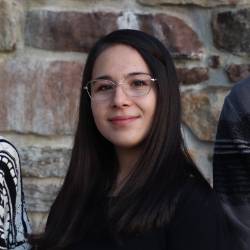
Isiku Buyuker
PhD - Materials Science and Engineering
Pursuing a PhD degree at Binghamton University was pivotal in my growth as a researcher. I began my research adventures as an undergraduate at Binghamton, during which I worked on two distinct topics of chemical research — computational chemistry and battery cathode engineering — and received transformative mentorship from my advisors. I feel privileged for the opportunity to engage with cutting-edge instrumentation, undertake groundbreaking research endeavors and absorb wisdom from preeminent professors in their respective domains. The indelible imprints of these encounters and the guidance I received from esteemed faculty within the Materials Science and Engineering program will endure with me. I reserve a special place of gratitude for my dedicated mentor, Prof. M. Stanley Whittingham.
Andrea Papaleo
4+1 BS - Physics /MS MSE
I chose the MSE 4+1 program because it is a great opportunity for students like me to get on a fast track to a job in industry. I was able to start working in a research group and take MSE courses in my fourth year while finishing up my bachelor's degree. Doing so allowed me to take what I've learned in the previous years and apply it to a real-world problem. The multidisciplinary approach gives me the chance to see how the physics, chemistry, and engineering come together to create an innovative new materials.
Marc Francis V. Hidalgo
PhD - Materials Science and Engineering
(Working for NECCES on next-generation battery cathodes for increased energy capacity)
I chose Binghamton University's Materials Science and Engineering program because it stands out as one of the few universities to offer the option for a Professional Science Master's (PSM) track. After graduating with a bachelor's degree, I felt that I was not knowledgeable enough in the sciences to work in industry. However, I was unsure if taking a master's degree was the right choice because I did not want to miss out on the growth and experience offered outside an academic setting. I found the perfect middle ground in a PSM degree, which is best described as the mix between an MS and an MBA. Through the PSM track, I was able to interact with and learn from my peers who work on different materials, as well as MBA students who have no background in materials at all. This allowed me to broaden my horizons and made me a more holistic individual who is well-versed both in the sciences and in communicating with non-specialists in my field. The PSM track's excellent mix of science and business has given me a competitive edge both in the academe and industry, allowing me to differentiate myself from other graduate students.

Mateusz Zuba
PhD - Materials Science and Engineering
My research implements multiple x-ray spectroscopy techniques to understand charge processes in lithium-ion battery cathodes. My main expertise is in X-ray photoelectron spectroscopy and X-ray absorption spectroscopy. Currently I am working on multiple projects and collaborations with many research groups, such as NECCES and Scialog: Advanced Energy Storage. Projects include traditional layered oxides, lithium-rich materials, vanadyl phosphates and rhenium oxides.

Zach Keck
BS - Chemistry with materials emphasis
MS - Materials Science and Engineering
The unique MSE 4+1 program allows you to come out of school with an MS in a thriving field in only one year, setting you apart from most entry-level applicants. It's becoming increasingly needed for education higher than the BS level to find a good job, which is the main reason I'm pursuing this degree. The brand-new, state-of-the-art Smart Energy Building is where all our classes are, which is an added plus to this program

